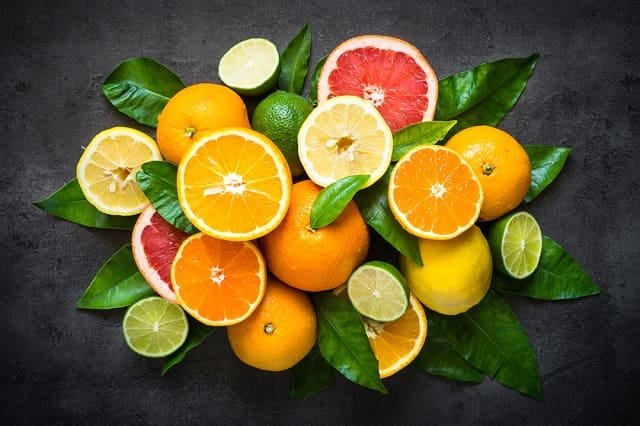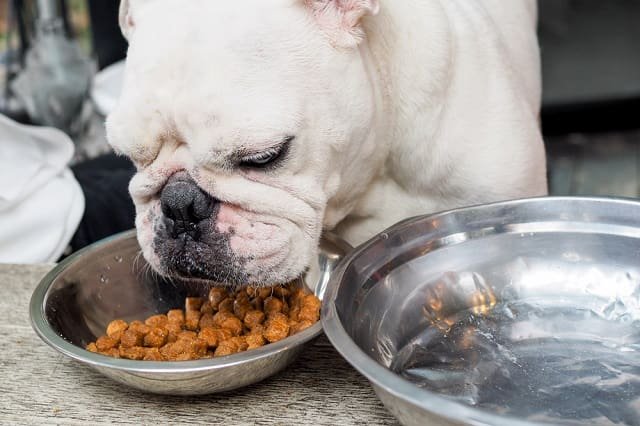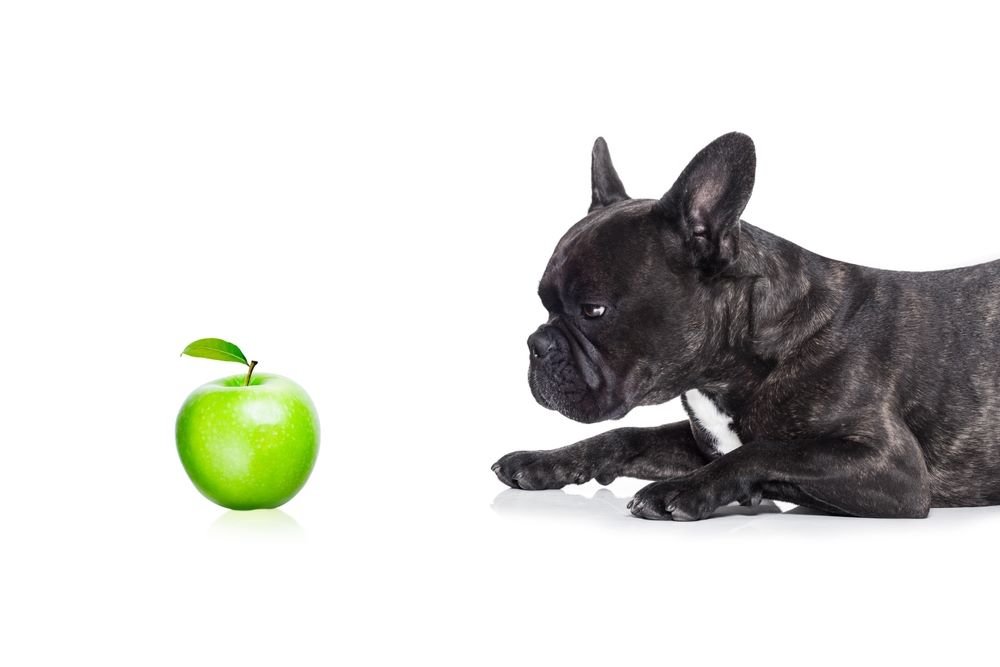Table of Contents
This blog will discuss the importance of maintaining a healthy diet for your furry friend and what fruit can French Bulldogs eat. With their adorable wrinkly faces and playful personalities, it’s no surprise that French Bulldogs have become one of the most popular dog breeds in recent years.
However, as loving owners, it’s important to recognize that providing them with proper nutrition is also essential to caring for their health and well-being. A balanced diet is key to keeping your French Bulldog in good shape, both physically and emotionally.
So, let’s dive into what a healthy diet should include for your furry companion!

French Bulldogs and Diet
French Bulldogs have specific dietary needs that should be carefully considered to ensure their health. As a brachycephalic breed, they have a unique body structure and metabolism, which can lead to specific health issues if dietary requirements are not met.
First and foremost, it’s crucial to consult with a veterinarian before making any significant changes to your French Bulldog’s diet. They can provide tailored advice based on your dog’s needs and health conditions. This is particularly important as some French Bulldogs may have food allergies or sensitivities to consider when selecting their diet.
When choosing the right food for your French Bulldog, choose high-quality, balanced dog food designed specifically for small-breed or brachycephalic dogs. This ensures that their nutritional needs are met, including the right amount of proteins, fats, carbohydrates, vitamins, and minerals.
Monitoring portion sizes is also essential, as French Bulldogs tend to gain weight quickly. Obesity can lead to various health problems, so feeding them the correct amount of food according to age, weight, and activity level is essential. Your veterinarian can guide you on proper portioning and feeding schedules.
Remember, every dog is unique, so what works for one may not work for another. Regularly monitor your French Bulldog’s weight and overall health and adjust their diet as needed, always under the guidance of a veterinarian. A well-balanced and carefully managed diet can help ensure your French Bulldog maintains optimal health and longevity.
Safe Fruits: What Fruit Can French Bulldogs Eat
Including fruits in your French Bulldog’s diet can be beneficial. Fruits are often low in calories and high in vitamins, minerals, and antioxidants. They can contribute to a well-rounded diet and offer additional flavor and variety. Additionally, the natural sugars found in fruits are healthier alternatives than processed sugars. Several fruits are generally safe for French Bulldogs as part of their diet.
Apples
Apples are a great source of vitamins A and C and dietary fiber. However, remember to remove the seeds and core before feeding them to your French Bulldog, as those can be choking hazards.
Bananas
Bananas are rich in potassium, vitamin B6, and dietary fiber. They also make for a tasty and nutritious treat for your furry friend.
Blueberries
Blueberries are packed with antioxidants and are known to support brain health. They are also low in calories, making them an excellent option for occasional treats.
Strawberries
Strawberries are a good vitamin C source and can boost your French Bulldog with essential nutrients. Like other fruits, remove the stems and any potential choking hazards before giving them to your dog.

Remember, moderation is key. Treat fruits as occasional snacks or part of a balanced diet alongside high-quality dog food that meets their nutritional needs.
Fruits to Avoid
Several fruits are considered unsafe for French Bulldogs and should be avoided.
Grapes and raisins
Grapes and raisins, although harmless, can be highly toxic to dogs. They can cause kidney failure, which can be life-threatening.
Cherries
Cherries, especially the pits and stems, contain cyanide and can lead to digestive issues, including obstruction or choking hazards.
Citrus fruits
Citrus fruits like oranges, lemons, and limes can cause stomach upset and diarrhea in dogs due to their high acidity.

Avocados
Avocados contain persin, which can be toxic to dogs, potentially causing vomiting, diarrhea, and even heart problems.
Persimmons
Persimmons can cause gastrointestinal blockages and upset, leading to discomfort and potential health complications.
Peaches and plums
The pits of peaches and plums can pose a choking hazard or cause intestinal obstruction if swallowed.
It’s crucial to avoid feeding these fruits to your French Bulldog as they can lead to various health problems, ranging from mild stomach upset to severe toxicity or obstructions. Always be cautious and aware of potential hazards when introducing new foods to your dog’s diet.
Remember, if your French Bulldog accidentally ingests any of these fruits or shows signs of illness, contact your veterinarian immediately for guidance and diagnosis. It’s better to be cautious about your dog’s health and well-being.
Moderation and Portion Control
Offering fruits to your French Bulldog in moderation is essential to ensure a well-balanced diet and prevent potential health issues. While fruits can provide valuable nutrients and vitamins, they should be treated as treats and not a primary source of nutrition.
Feeding fruits in moderation helps maintain a proper balance of nutrients and prevents excessive calorie intake. Fruits should make up only a tiny percentage of your dog’s overall diet, with most of their calories coming from high-quality dog food that meets their nutritional requirements.
Regarding portion sizes, it’s crucial to consider your dog’s size, age, and overall calorie needs. Here are some general guidelines:
- Miniature French Bulldogs (under 20 pounds): Offer around 1-2 tablespoons of fruit as a treat 3-4 times a week.
- Medium French Bulldogs (20-35 pounds): Provide around 2-3 tablespoons of fruit as a treat, 3-4 times a week.
- Large French Bulldogs (35 pounds or more): Offer approximately 3-4 tablespoons of fruit as a treat, 3-4 times a week.
Remember that these are rough estimates and can vary depending on your dog’s activity level and metabolism. If you have concerns about the ideal portion size for your French Bulldog, consult your veterinarian. They can provide personalized recommendations based on your dog’s needs and dietary requirements.
Always ensure that fruits are cut into small, bite-sized pieces that are easy for your French Bulldog to chew and swallow. Monitor your dog for signs of digestive upset or allergic reactions when introducing new fruits into their diet.
By maintaining moderation and portion control, you can enjoy the benefits of offering fruits as occasional treats to your French Bulldog while ensuring they receive a balanced and healthy diet.

Preparing Fruits For French Bulldogs
Properly preparing the fruits for your French Bulldog is essential to ensure the safety and health of your pet. Here are some guidelines for preparing fruits:
- Washing: Always wash the fruits before offering them to your French Bulldog. This helps remove dirt, pesticides, or bacteria on the fruit’s surface.
- Peeling: Some fruits may have tough or hard-to-digest skins that could cause digestive upset or choking hazards. In such cases, it’s best to peel the fruits before serving. For example, bananas and oranges should be peeled before feeding your French Bulldog.
- Cutting: Fruits should be cut into small, bite-sized pieces to make it easier for your French Bulldog to chew and digest. Large amounts may also pose a choking hazard, especially in smaller breeds like French Bulldogs.
It’s also essential to serve the fruits in a dog-friendly manner. Avoid adding any salt, sugar, or spices to the fruit. Some fruits contain pits or seeds that can cause digestive obstruction or choking hazards. Permanently remove them before serving the fruit to your pet. For example, you should remove the core and the seeds from an apple before offering it to your dog.
Additionally, fruits should only account for a small portion of your French Bulldog’s diet. Ensure your dog receives a balanced and high-quality diet, mainly dog food. Consult your veterinarian for the ideal portion size and frequency to feed fruits to your French Bulldog.
By following these guidelines, you can ensure that your French Bulldog is receiving the health benefits of fruits in a safe and dog-friendly manner.
Signs of Allergies or Digestive Issues
Pet owners should monitor their French Bulldogs for signs of allergies or digestive problems when introducing new foods. Symptoms of allergies may include excessive itching, red or inflamed skin, hives, swelling of the face, sneezing, vomiting, or difficulty breathing. Digestive problems can manifest as vomiting, diarrhea, abdominal discomfort, excessive gas, changes in appetite, or weight loss. It is essential to introduce new foods gradually, watch for any adverse reactions, and pay attention to changes in behavior, appetite, or stool.
If an allergy or digestive issue is suspected, discontinue the food and consult a veterinarian. Each dog’s tolerance and sensitivity may vary, so caution should be exercised when introducing new foods. Veterinarians can provide guidance and perform tests to identify specific allergies. Monitoring reactions to fresh foods ensures the safety and well-being of French Bulldogs.
Conclusion
When offering fruits to French Bulldogs, it is crucial to do so in moderation and as treats rather than as a primary source of nutrition. Portion sizes should be determined based on the dog’s size and needs. It is essential to wash, peel, and cut fruits into bite-sized pieces before serving them. Pet owners should watch for signs of allergies, such as itching or swelling, and digestive problems, including vomiting or diarrhea.
The fruit should be discontinued if any adverse reactions occur, and a veterinarian should be consulted. Responsible pet ownership entails prioritizing the health and well-being of French Bulldogs by providing a balanced diet and monitoring their reactions to new foods. Consulting with a veterinarian for personalized dietary guidance is always recommended to ensure the best care for your pet.
